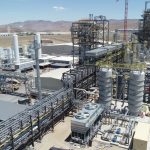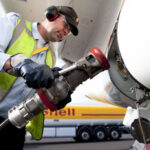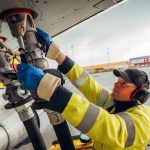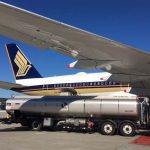A feasibility study jointly conducted by Air New Zealand and US-based waste-to-fuel developer LanzaJet has concluded that up to 25% of New Zealand’s domestic aviation fuel needs could be met using sustainable aviation fuel produced locally using woody waste residue as a feedstock. The SAF would be produced through a two-stage process, initially converting the wood to ethanol using the CirculAir carbon recycling technology developed by LanzaJet and its sibling, LanzaTech, then using LanzaJet’s alcohol-to-jet (AtJ) pathway to transform the ethanol to SAF. The airline’s Chief Sustainability and Corporate Affairs Officer, Kiri Hannifin, said the findings were “very positive for a country that is heavily reliant on long-haul aviation and trade and currently imports 100% of its jet fuel.” The NZ study result closely followed the announcement of a carbon-to-SAF partnership between LanzaTech and emerging Australian SAF producer Wagner Sustainable Fuels, and another in Japan between LanzaTech and the SEKISUI Chemical Company to convert municipal and industrial waste to ethanol then SAF.
The New Zealand study was co-funded by the airline and its majority shareholder, the New Zealand government, supported by Scion, a Crown research institute focused on forestry and wood products; fuel and infrastructure company Z Energy; and Wood Beca, a project engineering business specialising in oil, gas and wood, to explore opportunities for local production of non-fossil fuels for aviation.
Announcement of the report’s preliminary conclusions followed a contentious decision by the airline to scrap its 2030 carbon emissions reduction targets and withdraw from the Science Based Targets initiative (SBTi), citing challenges to the availability of new, lower-emission aircraft types and alternative fuels, and support from governments and regulators for decarbonisation initiatives.
“Alternative jet fuel such as SAF is currently the only real tool available to address carbon emissions from long-haul aviation, so it’s crucial for connecting New Zealanders, tourists and exporters with the rest of the world,” said Hannifin.
“There is already significant international momentum and, in our view, New Zealand shouldn’t get left too far behind, or we risk seeing the flow of capital go elsewhere, or our valuable raw materials being swooped up by other markets for their own SAF.
“The right settings and regulatory environment will be important as New Zealand considers homegrown SAF because it’s the only way to secure the necessary global investment.”
LanzaJet CEO Jimmy Samartzis welcomed initial results from the feasibility study and said a second phase was now underway to investigate the potential for household and commercial waste to also be used as fuel feedstock.
“Building a new industry requires developing a broad ecosystem for SAF in New Zealand, anchored in technology and supported by policy, capital and demand to help attract funding and make it at a price airlines can afford,” said Samartzis.
CirculAir, the SAF production approach assessed in the study, combines the technologies of LanzaTech and LanzaJet to convert waste carbon into SAF.
“The process starts with LanzaTech’s carbon recycling technology which, in this case, converts gasified forestry residues into ethanol. LanzaJet then converts that into SAF using its proprietary and industry-leading alcohol-to-jet (AtJ) technology,” explained Samartzis.
“Turning woody biomass into SAF is technically possible in New Zealand and with the right settings, is an industry that can get started fairly quickly. We look forward to completing additional analysis into what other feedstocks, such as municipal household and commercial waste, could be used to make domestic SAF production an even more attractive option.”
Soon before the conclusions were announced from the first phase of the New Zealand study, LanzaTech and LanzaJet signed an agreement to test their CirculAir carbon-to-SAF technology at ‘The Project,’ the Brisbane SAF refinery of Wagner Sustainable Fuels.
The first stage of this process uses LanzaTech’s carbon recycling technology to convert industrial emissions or municipal solid waste into ethanol, which is then transformed into drop-in SAF using LanzaJet’s AtJ technology.
The CirculAir platform is designed to unlock carbon from a multitude of waste-based resources, providing flexibility for feedstock conversion.
“The combination of LanzaJet’s leading SAF solution with the front end of LanzaTech’s proven and commercialised carbon recycling technology makes it possible to create a domestic SAF supply in Australia using local renewable waste sources, further supporting the country’s energy security while also working to protect its natural environment,” said LanzaJet’s Samartzis.
Matt Doyle, CEO of Wagner Sustainable Fuels, said the CirculAir partnership with LanzaTech and LanzaJet would advance his company’s Brisbane refinery and accelerate the development of a SAF industry in Australia, where multiple projects are now being scoped or progressing towards final investment decision.
“Together, these proven technologies can help us realise Australia’s first, fully integrated SAF production facility and provide a path to producing domestic fuel at scale,” he said.
The Wagner Project has also secured backing from both Boeing and the Queensland state government.
Earlier this year, LanzaJet also signed a licensing agreement with Jet Zero Australia, which is developing an AtJ SAF plant in Townsville, North Queensland, and will use agricultural biomass including sugar cane waste as a feedstock for the fuel.
Jet Zero, whose investors include Qantas, Airbus and Japanese petroleum group Idemitsu Kosan, plans to produce up to 102 million litres of SAF and 10 million litres of renewable diesel per year. It is targeting production from 2027.
LanzaTech has also partnered with Japan’s SEKISUI Chemical Company to jointly develop a platform which transforms syngas from municipal and industrial solid waste into ethanol, and then into products including sustainable aviation fuel.
Under a master licence agreement, SEKISUI plans to build multiple facilities across Japan, with the first expected to produce 10 to 12 kilotons of ethanol annually for use not only in SAF but also chemicals and materials including packaging and apparel. The deal extends a decade-long partnership between the two companies to divert garbage away from landfill or incineration for recycling as product feedstock.
Japan is active in recycling and decarbonisation and is one of the leading climate action markets in the Asia-Pacific region. Among its initiatives, it has mandated that by 2030 SAF will make up 10% of all fuel used by its domestic airlines and departing international carriers.
The expanded partnership between LanzaTech and SEKISUI follows the successful operation of a pilot plant established in 2017 in Yorii-machi, Saitama, and the completion in 2022 of a demonstration plant in Kuji City, Iwate, with annual capacity to convert approximately 400 tons of municipal solid waste to ethanol for further processing.
Each year, said the companies in their announcement, Japan generates some 56 million tons of combustible waste, which ordinarily would be sent to landfill facilities, “emitting methane, a greenhouse gas 23 times more potent than carbon dioxide,” or incinerated for power generation, emitting embedded carbon into the atmosphere.
Using the LanzaTech technology, unsorted combustible waste is gasified, then converted into ethanol through the use of a microbial catalyst and gas fermentation technology which requires no chemical catalysts, heat or pressure.
“We are pleased to expand our collaboration with longstanding partner LanzaTech, whose waste-to-ethanol technology is converting municipal solid waste into a valuable resource and providing an innovative solution to ending our reliance on fresh fossil fuels,” said Futoshi Kamiwaki, SEKISUI Representative Director and Senior Managing Executive Officer.
LanzaTech CEO Dr Jennifer Holmgren said the extended agreement also progressed her company’s vision for a circular carbon economy.
“We are grateful to SEKISUI for their commitment to scaling carbon recycling across Japan,” said Holmgren, “and for being at the forefront of developing a global blueprint for other countries and businesses to follow on how to access and utilise the carbon locked in local garbage.
“Our continued collaboration with SEKISUI is setting the groundwork for providing municipalities with a platform that reduces waste, captures carbon, generates valuable feedstocks and, importantly, creates jobs.
Photo: Air New Zealand
















More News & Features
Lessons learned from the collapse of Fulcrum BioEnergy
Early data shows uncertainty that UK SAF mandate can be met in its first year
Swiss advanced SAF technology startups Metafuels and Synhelion reach project milestones
PtX fuels have significant Asia-Pacific potential but face many barriers, finds report
Airfreight giants DHL Express and FedEx announce big US SAF deals
Asia-Pacific study reveals pessimistic outlook for SAF uptake by 2030 as Singapore details levy